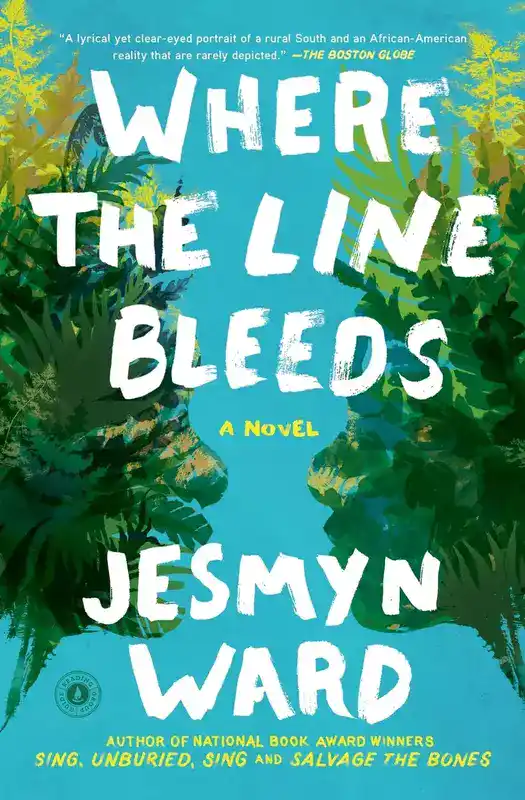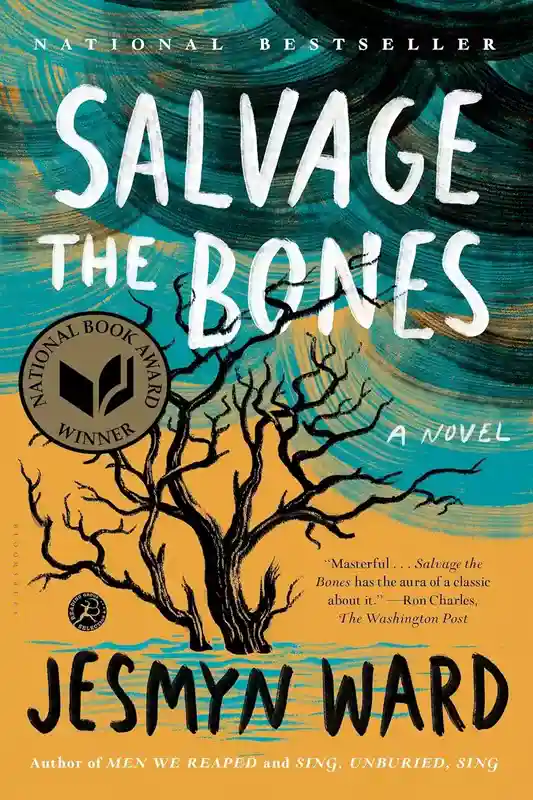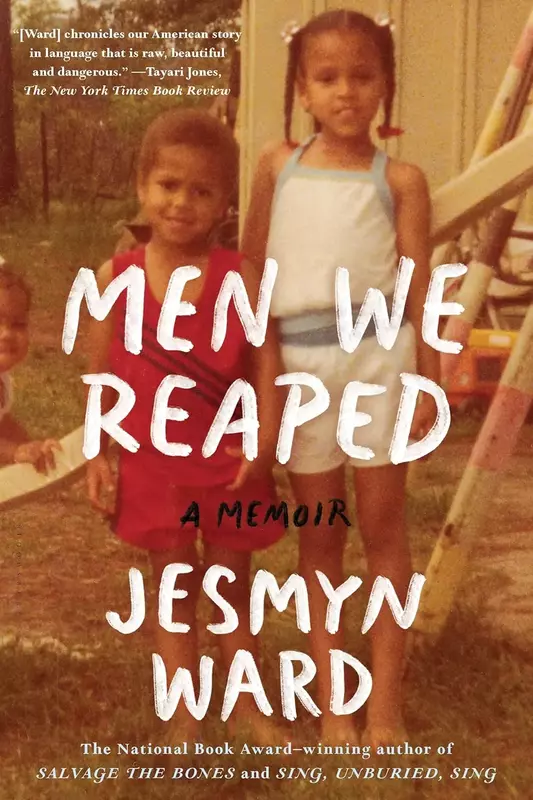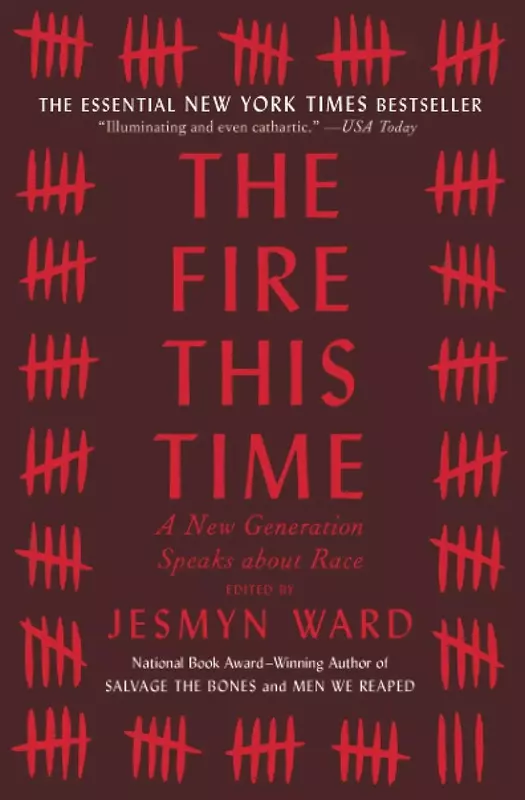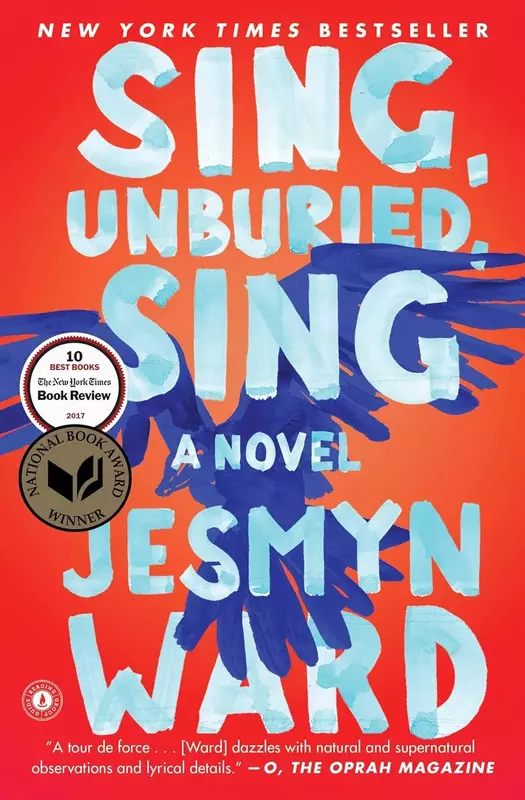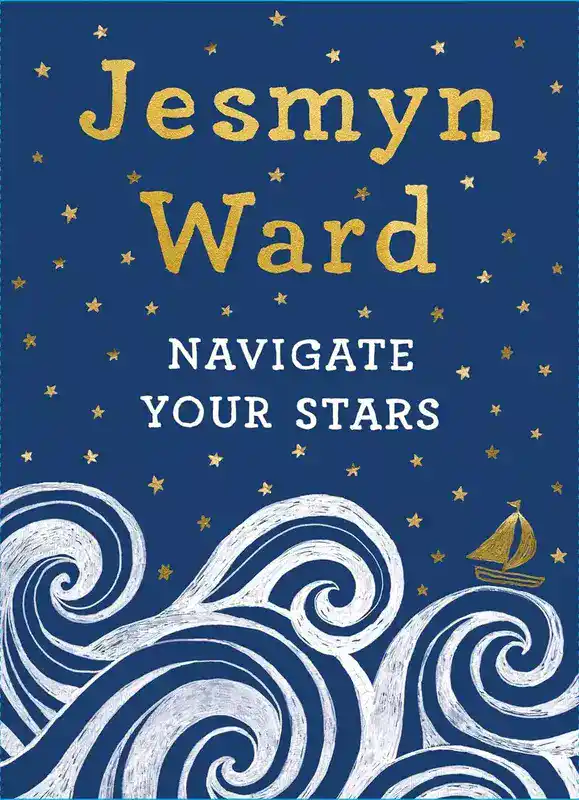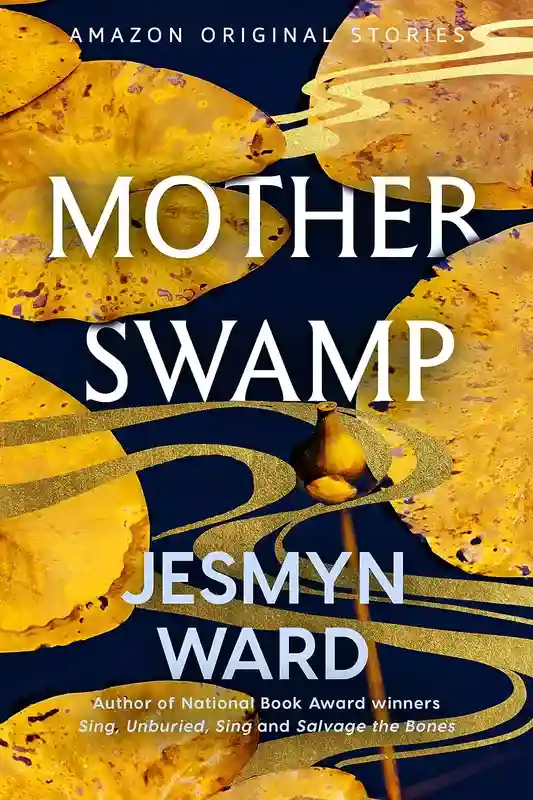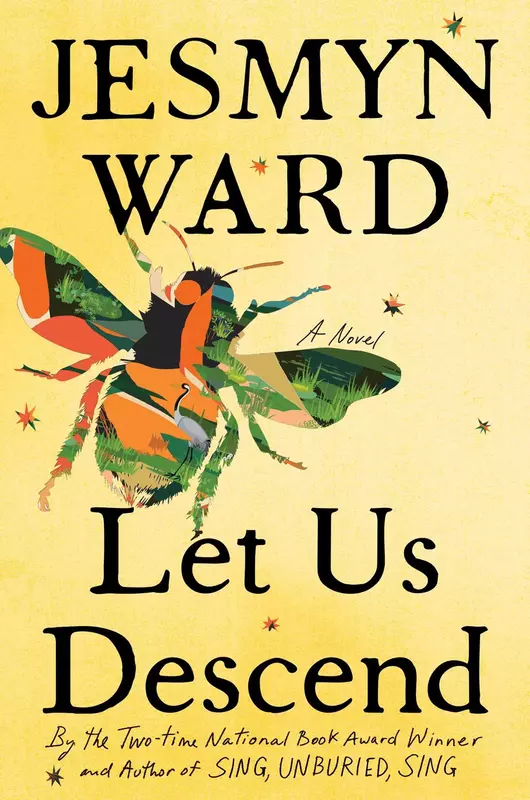This post may contain affiliate links. Read more here.
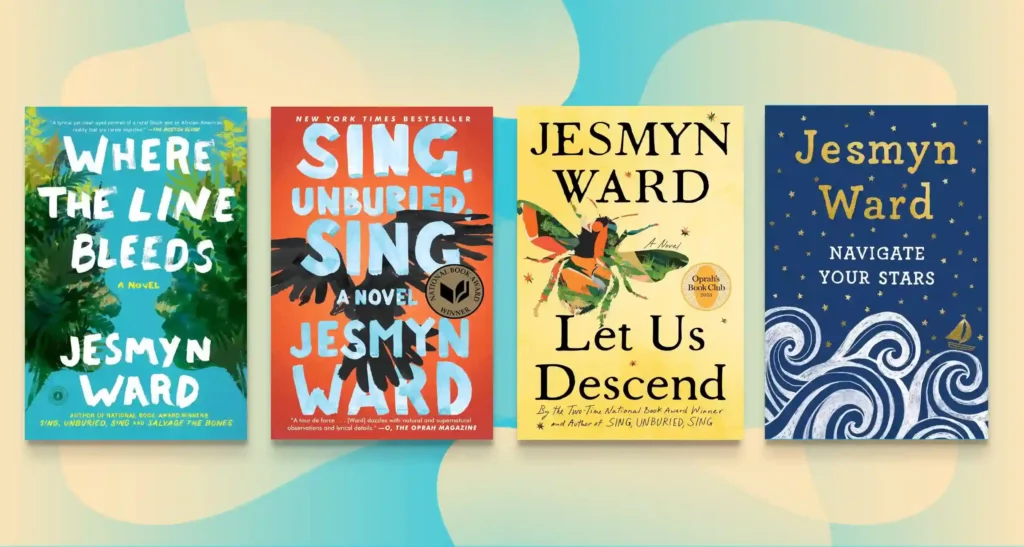
Jesmyn Ward is an American author, famous for her powerful and evocative writing, exploring themes of race, poverty, and family in the American South. She has received critical acclaim for her novels and memoirs.
Born in Berkeley, California, on April 1, 1977, and now a respected professor at Tulane University, Ward’s storytelling transcends mere narratives; it delves into the very essence of what it means to be human.
In this blog post, we will delve into Ward’s literary universe, presenting her books in chronological order, along with their storylines, genres, and release years.
For your convenience, a printable list of Jesmyn Ward books in order and book series is also attached at the bottom of this post. I hope you find this list useful! ✨
Books in Order | Common Questions | Printable List
About the Author

Jesmyn Ward, born on April 1, 1977, in Berkeley, California, is an accomplished American novelist and professor of English at Tulane University.
Ward’s literary journey began with her debut novel, Where the Line Bleeds, but it was her second novel, Salvage the Bones, that garnered critical acclaim. This poignant tale, set against the backdrop of Hurricane Katrina, won her the prestigious National Book Award for Fiction in 2011.
Ward’s dedication to capturing the complexities of human experiences continued with her memoir, Men We Reaped, and her third novel, Sing, Unburied, Sing, which earned her a second National Book Award in 2017, making her the first woman to win the award twice.
In 2022, she was honored with the Library of Congress Prize for American Fiction, recognizing her outstanding lifetime work. Despite facing personal hardships, including the loss of her husband, Ward’s writing continues to inspire readers worldwide.
She is currently an associate professor of creative writing at Tulane University and lives in Mississippi with her two children.
Jesmyn Ward Books in Order
Let’s explore Ward’s books in the order they were released. Each entry includes the book’s title, release date, a brief synopsis, and the genre it belongs to:
2006
Where the Line Bleeds
Genre: Coming of Age Fiction
The first novel from National Book Award winner and author of Sing, Unburied, Sing Jesmyn Ward, a timeless Southern fable of brotherly love and familial conflict—“a lyrical yet clear-eyed portrait of a rural South and an African American reality that are rarely depicted” (The Boston Globe).
Joshua and Christophe are twins, raised by a blind grandmother and a large extended family in rural Bois Sauvage, on Mississippi’s Gulf Coast. They’ve just finished high school and need to find jobs, but after Katrina, it’s not easy.
Joshua gets work on the docks, but Christophe’s not so lucky and starts to sell drugs. Christophe’s downward spiral is accelerated first by crack, then by the reappearance of the twins’ parents: Cille, who left for a better job, and Sandman, a dangerous addict. Sandman taunts Christophe, eventually provoking a shocking confrontation that will ultimately damn or save both twins.
Where the Line Bleeds takes place over the course of a single, life-changing summer. It is a delicate and closely observed portrait of fraternal love and strife, of the relentless grind of poverty, of the toll of addiction on a family, and of the bonds that can sustain or torment us.
Bois Sauvage, based on Ward’s own hometown, is a character in its own right, as stiflingly hot and as rich with history as it is bereft of opportunity. Ward’s “lushly descriptive prose…and her prodigious talent and fearless portrayal of a world too often overlooked” (Essence) make this novel an essential addition to her incredible body of work.
2011
Salvage the Bones
Genre: Black & African American Literature
Jesmyn Ward, two-time National Book Award winner and author of Sing, Unburied, Sing, delivers a gritty but tender novel about family and poverty in the days leading up to Hurricane Katrina.
A hurricane is building over the Gulf of Mexico, threatening the coastal town of Bois Sauvage, Mississippi, and Esch’s father is growing concerned. A hard drinker, largely absent, he doesn’t show concern for much else. Esch and her three brothers are stocking food, but there isn’t much to save.
Lately, Esch can’t keep down what food she gets; she’s fourteen and pregnant. Her brother Skeetah is sneaking scraps for his prized pitbull’s new litter, dying one by one in the dirt. Meanwhile, brothers Randall and Junior try to stake their claim in a family long on child’s play and short on parenting.
As the twelve days that make up the novel’s framework yield to their dramatic conclusion, this unforgettable family–motherless children sacrificing for one another as they can, protecting and nurturing where love is scarce–pulls itself up to face another day. A big-hearted novel about familial love and community against all odds, and a wrenching look at the lonesome, brutal, and restrictive realities of rural poverty, Salvage the Bones is muscled with poetry, revelatory, and real.
2012
Cattle Haul
Genre: U.S. Short Stories
“I tried not to think about what I had: a daddy slipping me crystal because he thought it was helping me make money, a asshole redneck boss, and a girl I hadn’t seen in almost a month, when I felt the sickness coming on.”
In her editor’s note, Brigid Hughes writes that this “glorious story,” which was National Book Award winner Jesmyn Ward’s first publication, has been unavailable to readers ever since A Public Space 5 sold out. “We’re so thrilled that Recommended Reading will give this story a new readership, and a new life.”
2013
Men We Reaped
Genre: Author Biographies
“We saw the lightning and that was the guns; and then we heard the thunder and that was the big guns; and then we heard the rain falling and that was the blood falling; and when we came to get in the crops, it was dead men that we reaped.” ―Harriet Tubman
In five years, Jesmyn Ward lost five young men in her life―to drugs, accidents, suicide, and the bad luck that can follow people who live in poverty, particularly black men. Dealing with these losses, one after another, made Jesmyn ask the question: Why? And as she began to write about the experience of living through all the dying, she realized the truth―and it took her breath away.
Her brother and her friends all died because of who they were and where they were from, because they lived with a history of racism and economic struggle that fostered drug addiction and the dissolution of family and relationships. Jesmyn says the answer was so obvious she felt stupid for not seeing it. But it nagged at her until she knew she had to write about her community, to write their stories and her own.
Jesmyn grew up in poverty in rural Mississippi. She writes powerfully about the pressures this brings, on the men who can do no right and the women who stand in for family in a society where the men are often absent. She bravely tells her story, revisiting the agonizing losses of her only brother and her friends. As the sole member of her family to leave home and pursue higher education, she writes about this parallel American universe with the objectivity distance provides and the intimacy of utter familiarity.
2016
The Fire This Time
Genre: Discrimination & Racism
The New York Times bestseller, these groundbreaking essays and poems about race—collected by National Book Award winner Jesmyn Ward and written by the most important voices of her generation—are “thoughtful, searing, and at times, hopeful. The Fire This Time is vivid proof that words are important, because of their power to both cleanse and to clarify” (USA TODAY).
In this bestselling, widely lauded collection, Jesmyn Ward gathers our most original thinkers and writers to speak on contemporary racism and race, including Carol Anderson, Jericho Brown, Edwidge Danticat, Kevin Young, Claudia Rankine, and Honoree Jeffers. “An absolutely indispensable anthology” (Booklist, starred review), The Fire This Time shines a light on the darkest corners of our history, wrestles with our current predicament, and imagines a better future.
Envisioned as a response to The Fire Next Time, James Baldwin’s groundbreaking 1963 essay collection, these contemporary writers reflect on the past, present, and future of race in America. We’ve made significant progress in the fifty-odd years since Baldwin’s essays were published, but America is a long and painful distance away from a “post-racial society”.
This is a truth we must confront if we are to continue to work towards change. Baldwin’s “fire next time” is now upon us, and it needs to be talked about; The Fire This Time “seeks to place the shock of our own times into historical context and, most importantly, to move these times forward” (Vogue).
2017
Sing, Unburied, Sing
Genre: Censorship & Politics, Coming of Age Fiction
A finalist for the Kirkus Prize, Andrew Carnegie Medal, Aspen Words Literary Prize, and a New York Times bestseller, this majestic, stirring, and widely praised novel from two-time National Book Award winner Jesmyn Ward, the story of a family on a journey through rural Mississippi, is a “tour de force” (O, The Oprah Magazine) and a timeless work of fiction that is destined to become a classic.
Jojo is thirteen years old and trying to understand what it means to be a man. He doesn’t lack in fathers to study, chief among them his Black grandfather, Pop. But there are other men who complicate his understanding: his absent White father, Michael, who is being released from prison; his absent White grandfather, Big Joseph, who won’t acknowledge his existence; and the memories of his dead uncle, Given, who died as a teenager.
His mother, Leonie, is an inconsistent presence in his and his toddler sister’s lives. She is an imperfect mother in constant conflict with herself and those around her. She is Black and her children’s father is White. She wants to be a better mother but can’t put her children above her own needs, especially her drug use. Simultaneously tormented and comforted by visions of her dead brother, which only come to her when she’s high, Leonie is embattled in ways that reflect the brutal reality of her circumstances.
When the children’s father is released from prison, Leonie packs her kids and a friend into her car and drives north to the heart of Mississippi and Parchman Farm, the State Penitentiary. At Parchman, there is another thirteen-year-old boy, the ghost of a dead inmate who carries all of the ugly history of the South with him in his wandering. He too has something to teach Jojo about fathers and sons, about legacies, about violence, about love.
2020
Navigate Your Stars
Genre: Censorship & Politics
A revelatory, uplifting, and gorgeously illustrated meditation on dedication, hard work, and the power of perseverance from the beloved, New York Times bestselling, and two-time National Book Award–winning Jesmyn Ward.
For Tulane University’s 2018 commencement, Jesmyn Ward delivered a stirring speech about the value of hard work and the importance of respect for oneself and others. Speaking about the challenges she and her family overcame, Ward inspired everyone in the audience with her meditation on tenacity in the face of hardship.
Ward’s moving words will inspire readers as they prepare for the next chapter in their lives, whether, like Ward, they are the first in their families to graduate from college or are preceded by generations, or whether they are embarking on a different kind of journey later in life.
Beautifully illustrated in full color by Gina Triplett, this gorgeous and profound book will charm a generation of students—and their parents. Ward’s inimitable voice shines through as she shares her experience as a Southern black woman and addresses the themes of grit, adversity, and the importance of family bonds.
2022
Mother Swamp
Genre: Black & African American Historical Fiction
A fever dream of the past that ripples outward to the modern world, this powerful short story by two-time National Book Award winner Jesmyn Ward draws inspiration from the hidden communities built by people escaping slavery.
Afice is the last of nine generations of women who have survived enslavement, sickness, and hunger. Alone at age seventeen, she sets out through the Louisiana swamps to follow the trail of her ancestors and hear their songs anew. On this journey, Afice must decide how to honor her ancestors while embracing her own future.
Jesmyn Ward’s Mother Swamp is part of A Point in Time, a transporting collection of stories about the pivotal moments, past and present, that change lives. Read or listen to each immersive story in a single sitting.
2023
Let Us Descend
Genre: Black & African American Historical Fiction
For my book club questions for this book, click here!
And for my spoiler-free review, click here!
Let Us Descend is a powerful and haunting reimagining of American slavery set in the years before the Civil War.
The story follows Annis, an enslaved girl who has been sold south by the white man who fathered her. Annis becomes the reader’s guide through a brutal landscape, from the rice fields of the Carolinas to the slave markets of New Orleans and the heart of a Louisiana sugar plantation.
Amidst the harrowing journey, Annis seeks solace in memories of her mother and tales of her African warrior grandmother. Throughout the narrative, Annis opens herself to a world beyond the physical realm, connecting with spirits of earth, water, myth, and history.
This novel is a profound exploration of Black American grief and joy, a tale of rebirth and reclamation, making it a masterful and deeply moving addition to Ward’s literary legacy.
Common questions
In this section, we’ve gathered answers to some common questions readers often have about Jesmyn Ward and her work.
How many books has Jesmyn Ward written?
Jesmyn Ward has written 7 books, including novels and memoirs, and 2 short stories. Some of her notable works include Where the Line Bleeds, Salvage the Bones, Men We Reaped, Sing, Unburied, Sing, and The Fire This Time.
What are Jesmyn Ward’s books in order?
- Where the Line Bleeds (2006)
- Salvage the Bones (2011)
- Cattle Haul (2012)
- Men We Reaped (2013)
- The Fire This Time (2016)
- Sing, Unburied, Sing (2017)
- Navigate Your Stars (2020)
- Mother Swamp (2022)
- Let Us Descend (2023)
Why was Jesmyn Ward bullied?
Jesmyn Ward was bullied during her time at a private school because she was shy, quiet, and loved reading books, qualities that made her stand out as a geek. Moreover, the students at her private school were predominantly white, came from privileged backgrounds, and she was the daughter of their maid, which led to a different form of bullying based on socioeconomic and racial differences.
What inspired Jesmyn Ward to become a writer?
Ward chose to become a writer to honor the memory of her younger brother, who was killed by a drunk driver after she completed her master’s degree. She was also influenced by her experiences growing up in the rural South and witnessing the struggles faced by her family and neighbors.
What is Jesmyn Ward writing style?
Jesmyn Ward’s writing style is characterized by the use of Southern gothic themes in her fiction. She adeptly combines these themes with a contemporary voice and subject matter, creating a unique narrative style. Ward’s work within the Southern gothic tradition is notable for its focus on marginalized narratives, providing a platform for voices often overlooked or suppressed in canonical literature.
Printable List
Prefer a handy, offline reference of Jesmyn Ward books in chronological order? Look no further!
Download and print this curated list to keep track of your reading journey through Jesmyn Ward stories.
Final thoughts
I hope you enjoyed this list of Jesmyn Ward’s books in chronological order.
Through her writing, Ward not only captures the struggles and triumphs of marginalized voices but also invites readers to confront the complexities of the human condition.
From the small Mississippi towns to the aftermath of Hurricane Katrina, her narratives pull you in and make you feel. As you turn the pages of her books, allow her stories to challenge your perspectives, evoke your empathy, and stir your soul.
Happy reading! ❤️
